人教版(2019)必修 第一册Unit 5 Languages around the world Reading for writing 课件(共24张PPT)
文档属性
| 名称 | 人教版(2019)必修 第一册Unit 5 Languages around the world Reading for writing 课件(共24张PPT) |  | |
| 格式 | pptx | ||
| 文件大小 | 6.0MB | ||
| 资源类型 | 教案 | ||
| 版本资源 | 人教版(2019) | ||
| 科目 | 英语 | ||
| 更新时间 | 2023-11-23 12:35:33 | ||
图片预览

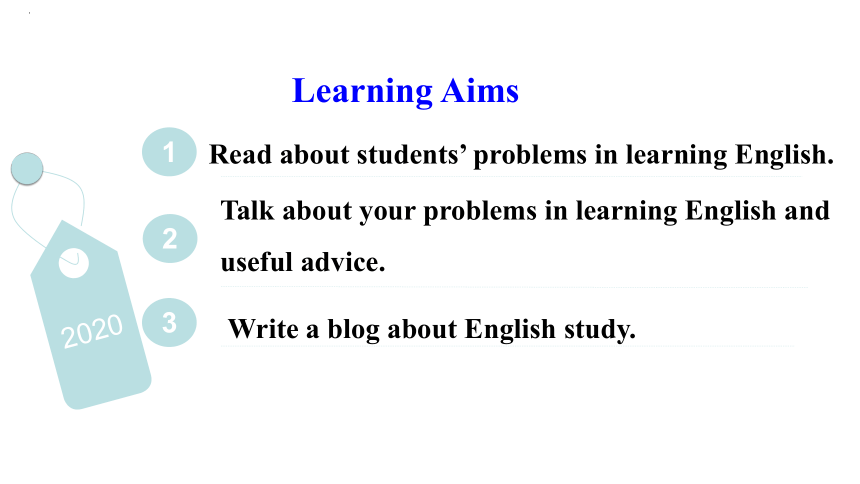
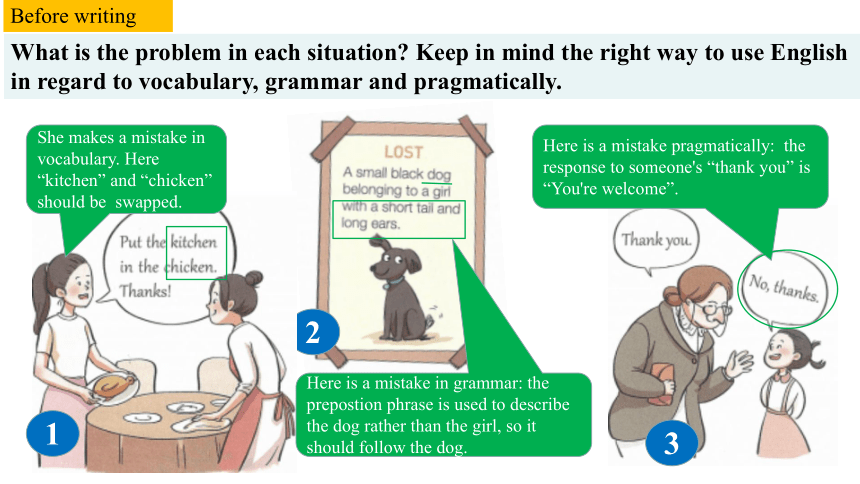
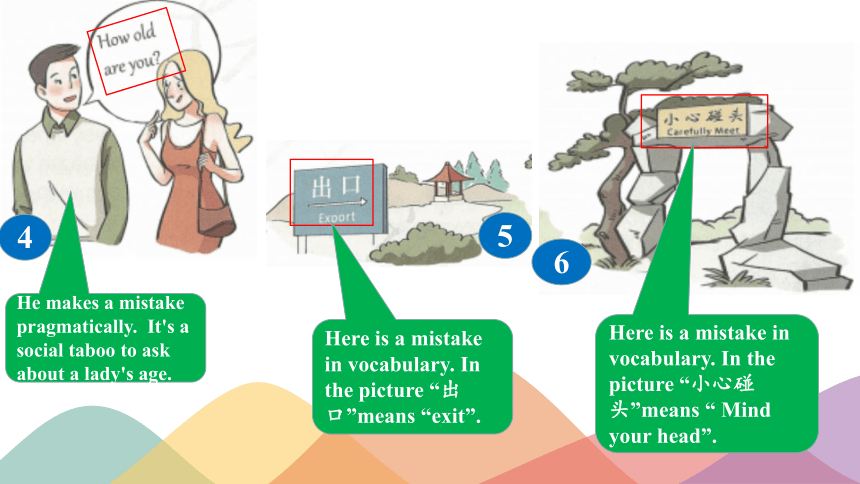
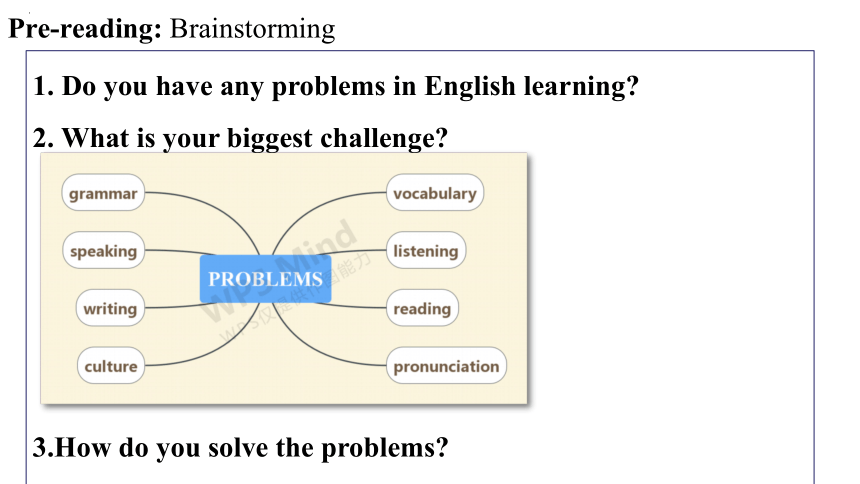
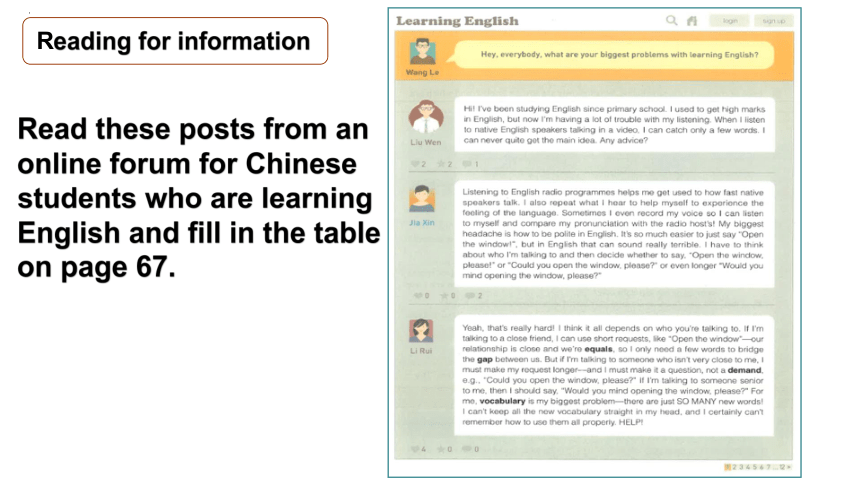
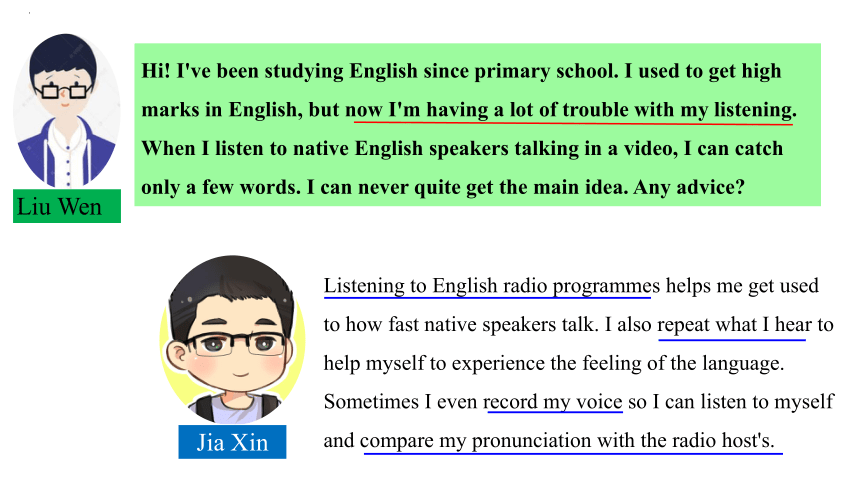
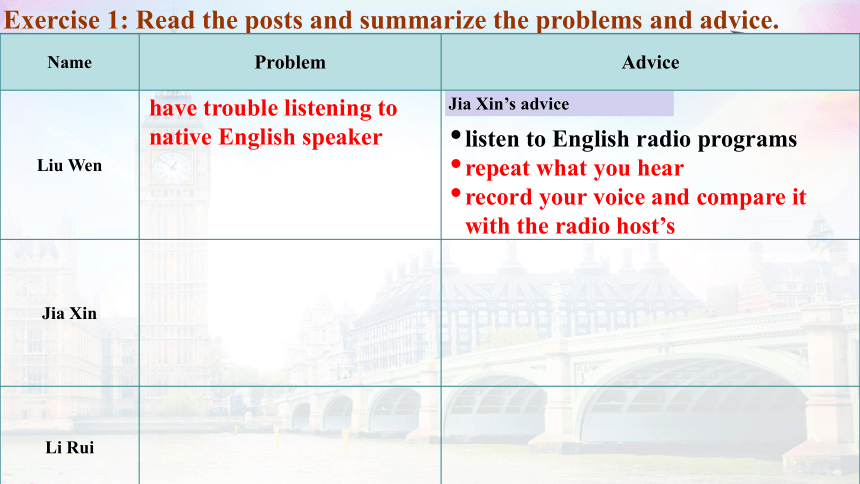

文档简介
(共24张PPT)
Languages around the world–Reading for Writing
Write a blog about English study
2020
Read about students’ problems in learning English.
1
Talk about your problems in learning English and useful advice.
2
Write a blog about English study.
3
Learning Aims
2
1
Before writing
What is the problem in each situation Keep in mind the right way to use English in regard to vocabulary, grammar and pragmatically.
3
Here is a mistake pragmatically: the response to someone's “thank you” is “You're welcome”.
Here is a mistake in grammar: the prepostion phrase is used to describe the dog rather than the girl, so it should follow the dog.
She makes a mistake in vocabulary. Here “kitchen” and “chicken” should be swapped.
4
5
6
He makes a mistake pragmatically. It's a social taboo to ask about a lady's age.
Here is a mistake in vocabulary. In the picture “出口”means “exit”.
Here is a mistake in vocabulary. In the picture “小心碰头”means “ Mind your head”.
1. Do you have any problems in English learning
2. What is your biggest challenge
3.How do you solve the problems
Pre-reading: Brainstorming
Read these posts from an online forum for Chinese students who are learning English and fill in the table on page 67.
Reading for information
Hi! I've been studying English since primary school. I used to get high marks in English, but now I'm having a lot of trouble with my listening. When I listen to native English speakers talking in a video, I can catch only a few words. I can never quite get the main idea. Any advice
Liu Wen
Listening to English radio programmes helps me get used to how fast native speakers talk. I also repeat what I hear to help myself to experience the feeling of the language. Sometimes I even record my voice so I can listen to myself and compare my pronunciation with the radio host's.
Jia Xin
Exercise 1: Read the posts and summarize the problems and advice.
Name Problem Advice
Liu Wen
Jia Xin
Li Rui
Jia Xin’s advice
have trouble listening to native English speaker
listen to English radio programs
repeat what you hear
record your voice and compare it with the radio host’s
What suggestions can you give to him on listening
be in a totally English-speaking environment.
watch TV shows or movies in English.
download an app called VOA
My biggest headache is how to be polite in English. It’s so much easier to just say “Open the window!”, but in English that can sound really terrible. I have to think about who I'm talking to and then decide whether to say, “Open the window, please!” or “Could you open the window, please ” or even longer “Would you mind opening the window, please ”
Jia Xin
Li Rui
Yeah, that’s really hard! I think it all depends on who you’re talking to. If I’m talking to a close friend, I can use short requests, like “Open the window”– our relationship is close and we’re equals, so I only need a few words to bridge the gap between us. But if I’m talking to someone who isn’t very close to me, I must make my request longer—and I must make it a question, not a demand, e.g., “Could you open the window, please ” If I’m talking to someone senior to me, then I should say, “Would you mind opening the window, please ” For me, vocabulary is my biggest problem—there are just SO MANY new words! I can’t keep all the new vocabulary straight in my head, and I certainly can’t remember how to use them all properly. HELP!
Name Problem Advice
Liu Wen
Jia Xin
Li Rui
Jia Xin’s advice
Li Rui’s advice
have trouble with listening to native English speaker
listen to English radio programs
repeat what you hear
record your voice and compare it with the radio host’s
be polite in English
It depends on whom you are talking to
Li Rui
For me, vocabulary is my biggest problem—there are just SO MANY new words! I can’t keep all the new vocabulary straight in my head, and I certainly can’t remember how to use them all properly. HELP!
Name Problem Advice
Liu Wen
Jia Xin
Li Rui
Jia Xin’s advice
Li Rui’s advice
Your advice
have trouble with listening to native English speaker
listen to English radio programs
repeat what you hear
record your voice and compare it with the radio host’s
be polite in English
It depends on whom you are talking to
remember new vocabulary
Write down the new words in your notebook and carry it wherever you go.
Download some apps for learning vocabulary.
Use or practise the words by making sentences.
Learn word chunk instead of single word.
What’s your advice given to Li Rui on remembering new words
sort out your vocabulary based on topics
read a lot
Don't just work on the words required by the exams.
How to expand your vocabulary
Keep a diary in English.
Make foreign friends online, visit chat rooms, or post comments in English on blogs.
Possible advice on writing
Recite some writing samples.
Read the blogs on page 67 again and find the sentences about describing problems in learning English.
But now I’m having a lot of trouble with my listening.
I can catch only a few words.
I can never quite get the main idea.
My biggest headache is how to be polite in English.
For me, vocabulary is my biggest problem.
I can’t keep all the new vocabulary straight in my head.
I certainly can’t remember how to use them all properly.
Useful Structures
Describing problems
I don’t know how to……
… is a big difficulty for me.
... is my biggest problem
I can not/ I can never…
I have no idea how/what..
My biggest problem/headache is …
I (also) have trouble with…
I have some difficulties in …
Giving advice
You might try...
My advice is ...
It’s very important to...
It is a good idea for you to ...
Writing
Step 3: Write some ideas on how to solve the problem.
Step 2: Describe the problem with more details.
Step 1: Think of a problem you have in learning English.
Write a blog about your problem in learning English and some possible solutions.
Step 4: Connect the problem and advice together by using
those sentence structures.
Sample:
I have trouble with phrasal verbs. There are so many of them and it seems impossible to work out the meanings just from the words. And some of the verbs have different meanings. For example, “put off” can mean postpone, discourage and make someone dislike. I try to use phrasal verbs sometimes, but I usually use the wrong one!
My classmates had some suggestions for me. One was to use flash cards on which I write down the phrasal verb. Then I can study them when I have time, like on the bus. Another suggestion was to make sentences by using the phrasal verbs and the sentences are related to my life,which makes it easy for me to remember. For example, I always put off doing my homework.
I think my classmates gave me some good advice. I’m trying them now. I hope they will work for me.
Post-reading: Presentation
Put up your writing in the classroom or read it to the class.
Post-reading: Assessing
Exchange drafts. Assess each other’s work according to the checklist.
General content Does the writer give a clear description of the problem
Is the advice clearly explained
Does each sentence relate to the main idea
Basic writing skills Does the writer use pronouns to refer to things or people correctly
Does the writer use correct spelling, punctuation, and capitalisation
Are there any grammar mistakes
I struggle with some problems in remembering new words. No matter how hard I work, the words always escape me, which makes me refer to my notes constantly. What’s worse, no matter how much time I spend, I end up remembering only a few words.
My classmates had some suggestions for me. They stated that it was a good idea to master the phonetics first. Then I can spell the words out according to the pronunciation. Another advice was to memorize words in groups,that is, make as many associations and connections as possible.Never memorize single English words.
I think my classmates gave me some good advice. I’m trying them now. I hope they will work for me.
Languages around the world–Reading for Writing
Write a blog about English study
2020
Read about students’ problems in learning English.
1
Talk about your problems in learning English and useful advice.
2
Write a blog about English study.
3
Learning Aims
2
1
Before writing
What is the problem in each situation Keep in mind the right way to use English in regard to vocabulary, grammar and pragmatically.
3
Here is a mistake pragmatically: the response to someone's “thank you” is “You're welcome”.
Here is a mistake in grammar: the prepostion phrase is used to describe the dog rather than the girl, so it should follow the dog.
She makes a mistake in vocabulary. Here “kitchen” and “chicken” should be swapped.
4
5
6
He makes a mistake pragmatically. It's a social taboo to ask about a lady's age.
Here is a mistake in vocabulary. In the picture “出口”means “exit”.
Here is a mistake in vocabulary. In the picture “小心碰头”means “ Mind your head”.
1. Do you have any problems in English learning
2. What is your biggest challenge
3.How do you solve the problems
Pre-reading: Brainstorming
Read these posts from an online forum for Chinese students who are learning English and fill in the table on page 67.
Reading for information
Hi! I've been studying English since primary school. I used to get high marks in English, but now I'm having a lot of trouble with my listening. When I listen to native English speakers talking in a video, I can catch only a few words. I can never quite get the main idea. Any advice
Liu Wen
Listening to English radio programmes helps me get used to how fast native speakers talk. I also repeat what I hear to help myself to experience the feeling of the language. Sometimes I even record my voice so I can listen to myself and compare my pronunciation with the radio host's.
Jia Xin
Exercise 1: Read the posts and summarize the problems and advice.
Name Problem Advice
Liu Wen
Jia Xin
Li Rui
Jia Xin’s advice
have trouble listening to native English speaker
listen to English radio programs
repeat what you hear
record your voice and compare it with the radio host’s
What suggestions can you give to him on listening
be in a totally English-speaking environment.
watch TV shows or movies in English.
download an app called VOA
My biggest headache is how to be polite in English. It’s so much easier to just say “Open the window!”, but in English that can sound really terrible. I have to think about who I'm talking to and then decide whether to say, “Open the window, please!” or “Could you open the window, please ” or even longer “Would you mind opening the window, please ”
Jia Xin
Li Rui
Yeah, that’s really hard! I think it all depends on who you’re talking to. If I’m talking to a close friend, I can use short requests, like “Open the window”– our relationship is close and we’re equals, so I only need a few words to bridge the gap between us. But if I’m talking to someone who isn’t very close to me, I must make my request longer—and I must make it a question, not a demand, e.g., “Could you open the window, please ” If I’m talking to someone senior to me, then I should say, “Would you mind opening the window, please ” For me, vocabulary is my biggest problem—there are just SO MANY new words! I can’t keep all the new vocabulary straight in my head, and I certainly can’t remember how to use them all properly. HELP!
Name Problem Advice
Liu Wen
Jia Xin
Li Rui
Jia Xin’s advice
Li Rui’s advice
have trouble with listening to native English speaker
listen to English radio programs
repeat what you hear
record your voice and compare it with the radio host’s
be polite in English
It depends on whom you are talking to
Li Rui
For me, vocabulary is my biggest problem—there are just SO MANY new words! I can’t keep all the new vocabulary straight in my head, and I certainly can’t remember how to use them all properly. HELP!
Name Problem Advice
Liu Wen
Jia Xin
Li Rui
Jia Xin’s advice
Li Rui’s advice
Your advice
have trouble with listening to native English speaker
listen to English radio programs
repeat what you hear
record your voice and compare it with the radio host’s
be polite in English
It depends on whom you are talking to
remember new vocabulary
Write down the new words in your notebook and carry it wherever you go.
Download some apps for learning vocabulary.
Use or practise the words by making sentences.
Learn word chunk instead of single word.
What’s your advice given to Li Rui on remembering new words
sort out your vocabulary based on topics
read a lot
Don't just work on the words required by the exams.
How to expand your vocabulary
Keep a diary in English.
Make foreign friends online, visit chat rooms, or post comments in English on blogs.
Possible advice on writing
Recite some writing samples.
Read the blogs on page 67 again and find the sentences about describing problems in learning English.
But now I’m having a lot of trouble with my listening.
I can catch only a few words.
I can never quite get the main idea.
My biggest headache is how to be polite in English.
For me, vocabulary is my biggest problem.
I can’t keep all the new vocabulary straight in my head.
I certainly can’t remember how to use them all properly.
Useful Structures
Describing problems
I don’t know how to……
… is a big difficulty for me.
... is my biggest problem
I can not/ I can never…
I have no idea how/what..
My biggest problem/headache is …
I (also) have trouble with…
I have some difficulties in …
Giving advice
You might try...
My advice is ...
It’s very important to...
It is a good idea for you to ...
Writing
Step 3: Write some ideas on how to solve the problem.
Step 2: Describe the problem with more details.
Step 1: Think of a problem you have in learning English.
Write a blog about your problem in learning English and some possible solutions.
Step 4: Connect the problem and advice together by using
those sentence structures.
Sample:
I have trouble with phrasal verbs. There are so many of them and it seems impossible to work out the meanings just from the words. And some of the verbs have different meanings. For example, “put off” can mean postpone, discourage and make someone dislike. I try to use phrasal verbs sometimes, but I usually use the wrong one!
My classmates had some suggestions for me. One was to use flash cards on which I write down the phrasal verb. Then I can study them when I have time, like on the bus. Another suggestion was to make sentences by using the phrasal verbs and the sentences are related to my life,which makes it easy for me to remember. For example, I always put off doing my homework.
I think my classmates gave me some good advice. I’m trying them now. I hope they will work for me.
Post-reading: Presentation
Put up your writing in the classroom or read it to the class.
Post-reading: Assessing
Exchange drafts. Assess each other’s work according to the checklist.
General content Does the writer give a clear description of the problem
Is the advice clearly explained
Does each sentence relate to the main idea
Basic writing skills Does the writer use pronouns to refer to things or people correctly
Does the writer use correct spelling, punctuation, and capitalisation
Are there any grammar mistakes
I struggle with some problems in remembering new words. No matter how hard I work, the words always escape me, which makes me refer to my notes constantly. What’s worse, no matter how much time I spend, I end up remembering only a few words.
My classmates had some suggestions for me. They stated that it was a good idea to master the phonetics first. Then I can spell the words out according to the pronunciation. Another advice was to memorize words in groups,that is, make as many associations and connections as possible.Never memorize single English words.
I think my classmates gave me some good advice. I’m trying them now. I hope they will work for me.
